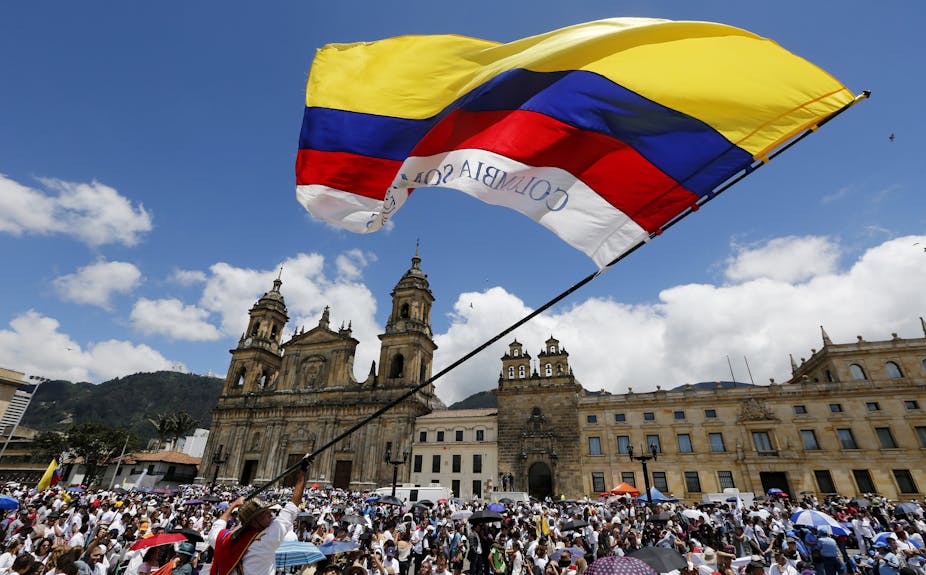Colombian President Juan Manuel Santos and Rodrigo Londoño – alias Timochenko, the leader of Latin America’s longest-running insurgency, the FARC – have signed a historic deal which sets out a process of transitional justice for Colombia. They have committed to signing the final peace agreement within six months.
After more than five decades of armed conflict, six months is the blink of an eye, and both Colombia and the wider world must think fast to work out what comes next.
The FARC is the largest, yet by no means the only armed group operating in Colombia. The peace deal may lead to its demobilisation but will do nothing to tackle Colombia’s other violent groups – the ELN, the EPL and numerous right-wing groups will continue to operate after the agreement with the FARC is signed. Many of them are the remnants of now-dismantled paramilitaries and criminal organisations involved in drug trafficking and other forms of organised crime.
The peace deal could radically reshuffle these armed groups – and the consequences could be chaotic.
Shattered order
For decades, FARC has dominated vast areas of the country, where it has imposed rules of behaviour ranging from dress codes and curfews to conflict resolution mechanisms.
And yet, when I visited these territories during my own fieldwork in Colombia, many local people told me they were grateful to have had at least some source of order to organise their everyday lives because the state has never been there to do so.
Notwithstanding the ever-shifting balance of power between the FARC and its adversaries, at least in the rural areas the rules of the game were relatively clear and predictable. That meant civilians could adapt their lives to the FARC’s “shadow governance”.
If signed, the peace deal will shatter this questionable, yet enduring order. First, rather than a new, harmonious order in which demobilised combatants engage in local politics, the post-FARC-period could be very unstable and dangerous indeed. The risk is that various armed groups – old and new, leftist and rightist – will fight to take the FARC’s place.
This will make life highly unstable for local people until it becomes clear who the new de facto “ruler” is. And it’s not at all clear that it will be the state.
One step ahead
If a power vacuum opens up, Colombia’s assorted violent non-state groups are likely to threaten demobilised FARC members and militias. The recent agreement expects that the FARC will give up its weapons within 60 days of the final peace deal, but it says nothing about who will protect the demobilised FARC members and their collaborators during or after the messy process.

Civilian informants and innocent citizens who want a say in local politics are also going to be at risk. In marginalised, inaccessible regions where the state will hold little sway, paramilitary successor groups and criminal organisations have an interest in deterring people from doing so in order to maintain their power.
The implications are obvious: Colombia needs a clear post-agreement security strategy to tackle the remaining violent groups, especially in its marginalised regions.
On one hand, if the government doesn’t officially start peace talks with the ELN, former FARC members will simply join that group and continue their activities under its aegis. That’ll be a particularly smooth transition for guerrillas in regions where the FARC and ELN have been operating in strategic alliances.
On the other hand, the government must treat right-wing groups as the serious threats they are. Establishing proper civilian institutions in marginalised regions and engaging the people who live there in legitimate politics is crucial for the peace deal to be appreciated by those most affected by the conflict. But even if that’s feasible, it’ll take years or decades to roll out. If a new cycle of violence is to be avoided, protecting the marginalised communities in these groups’ path must come first.
Despite these risks, we should not be too pessimistic about Colombia’s future. The recent agreement is a historic step towards a more peaceful country, and it should be acknowledged as such. But if Colombia’s leaders get inebriated by this breakthrough and blinded by the prospects of an ever-so-close peace agreement, they may forget to keep thinking one step ahead – crucial if they want to keep their citizens safe.

